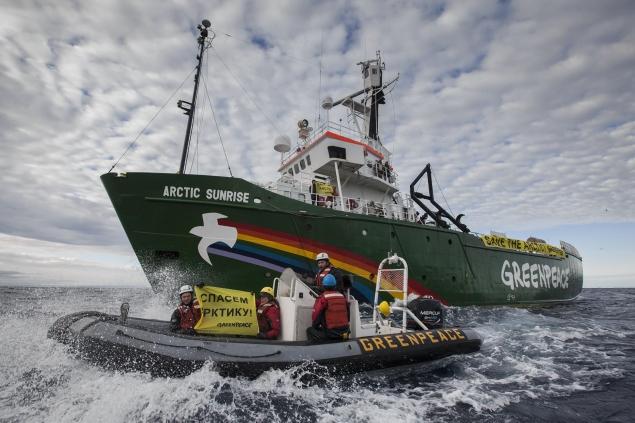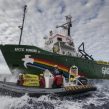
Russia Ready to Use Force to Deny Other Countries Free Navigation of Arctic High Seas
Publication: Eurasia Daily Monitor Volume: 10 Issue: 176
By:

Activists detained onboard the Greenpeace Arctic Sunrise research icebreaker by the Federal Security Service special forces (FSB spetsnaz) on September 19, have been all handed two-month pre-trial detention sentences by Russian judges in Murmansk. The activists were protesting oil drilling by Gazprom in the southeastern part of the Barents Sea, known as the Pechora Sea. All 30 activists from 18 different nationalities, including the ship’s Ukrainian cook, have been officially accused of “piracy” and may be sentenced from 10 to 15 years in prison if found guilty. Lawyers employed by Greenpeace have been appealing the detention rulings, demanding bail or house arrest in vain. The Russian Investigative Committee (SKR) has accused the Greenpeace activists of “endangering the personal security of the workers of the Prirazlomnaya oil rig and resisting the FSB spetsnaz.” Foreign governments, including Ukraine, have protested the detention of their nationals to no avail. The Arctic Sunrise has been impounded in the port of Murmansk and is being searched by SKR investigators, who have seized its documents and equipment (https://www.interfax.ru/print.asp?sec=1446&id=332200).
In the Russian legal system, a lengthy pre-trial detention guarantees a guilty sentence with more than a 99-percent certainty, and the Arctic Sunrise crew will be denied a jury trial. Pre-trial prison terms can be extended and often last for years. No real harm was actually done during the Prirazlomnaya protest: The Arctic Sunrise circled the Prirazlomnaya oil rig, sending several inflatable speedboats with activists up close, while two tried to climb onboard to hang a protest banner and were detained. President Vladimir Putin seemed to publicly contradict the SKR investigators, announcing last week at an international Arctic conference in Salekhard, in the Yamalo-Nenets Autonomous Okrug, “The Greenpeace activists were definitely not pirates, but they did attempted to take possession of the oil rig and had broken international law” (https://www.interfax.ru/print.asp?sec=1448&id=331057). But hopes that the Russian authorities may release the activists after a relatively short arrest and perhaps a fine soon evaporated. The SKR pressed the pirating charges, while Putin pretended to be powerless to influence the Russian legal system. As his press secretary, Dmitry Peskov, told journalists: “Putin was merely expressing his personal opinion [about piracy charges]; all questions must be addressed to the SKR” (https://www.newsru.com/arch/russia/26sep2013/peskov.html).
A well-known Russian photo correspondent, Denis Sinyakov, was on the Arctic Sunrise and in one of the speedboats near the oil rig, taking pictures of the action. Sinyakov was arrested with the rest and sentenced to two months of pre-trial detention. Many Russian media organizations protested Sinyakov’s arrest and detention, stressing that a professional journalist cannot be punished for covering an event (https://lenta.ru/news/2013/09/27/letter/). The authorities ignored the protest. Sinyakov remains in custody and has been officially charged with “piracy” (https://www.interfax.ru/print.asp?sec=1448&id=332499).
The orders to treat the Greenpeace activists and the Arctic Sunrise crew with the utmost severity seem to have come from the Kremlin. According to Nikolai Petrov from the Carnegie Moscow Center: “Putin sees the Greenpeace action as a personal attack, because it coincided with his address at the international Arctic conference in Salekhard. The authorities are deliberately attempting to terrorize Greenpeace to not poke its nose into [Russia’s] Arctic. Putin believes ecological organizations are being used by Russia’s competitors to stick wrenches into important works. Putin’s words about Greenpeace ‘not [being] pirates’ mean nothing, this is a practical joke.” Prime Minister Dmitry Medvedev has backed Putin by demanding a special law be adapted to make it a punishable felony to enter the perimeter of oil or natural gas installations under any guise, including ecological protest. Sources in the SKR reportedly told journalists: “This is a political matter. Greenpeace is part of the world government; they want to undermine our oil industry” (https://www.ng.ru/politics/2013-10-03/1_greenpeace.html).
Moscow has extended sovereign claims to almost half of the Arctic and fears that more powerful nations like China or the United States may undermine its control of the icy waters that may hide large oil and gas deposits. But the potentially disputed areas with Canada, Greenland or the US are far north, near the pole, and are today covered with heavy ice all year round—not available for underwater drilling for decades, even if the northern ice cap continues to melt as some scientists predict. The Prirazlomnaya rig is doing exploration drilling in the Pechora Sea in waters that are an undisputed part of Russia’s exclusive economic zone. It would seem that the threat in the North that Moscow fears today is the possibility of losing control of the Northern Sea Route (Severnyy Morskoy Put, or “Sevmorput”)—the short seaway from the Atlantic to the Pacific north of Siberia that may be open to increasingly heavy commercial activity and traffic soon in the coming years as the ice cap melts (Kommersant, May 16).
Russia believes it holds a monopoly over use of the Sevmorput and sees the waters north of Siberia up to the pole de facto as territorial. The Russian military today considers any ship that tries to navigate the waters of the Sevmorput anywhere from Murmansk to Alaska without specific Russian "razreshenye" (approval, permission) as an intruder that must be boarded and stopped. The Russian border guard ship that was shadowing the movement of the Arctic Sunrise in the Barents Sea demanded it withdraw before it reached the Prirazlomnaya rig because it was navigating the Sevmorput without a razreshenye; though under international law, it stayed in international waters the entire time and was, in fact, boarded on the high seas. Putin told United Russia party activists this week: “With great effort and expense, we have reestablished a military base on the New Siberian Islands [between the Laptev Sea and the East Siberian Sea north of the Sakha (Yakutia) Republic] that was abandoned in 1994.” A flotilla of some 30 ships, including four icebreakers and the nuclear cruiser Pyotr Veliky, landed equipment, supplies and a large garrison that will stay the winter in on the icy land, working to restore the base and extend its runway (see EDM, September 23). The main purpose of the base, according to Putin, is to secure the Sevmorput (https://www.interfax.ru/print.asp?sec=1448&id=332517). The Arctic Sunrise confrontation has set an example for others—Russia is ready to use force to deny any other nation free navigation of the high seas in the North.




